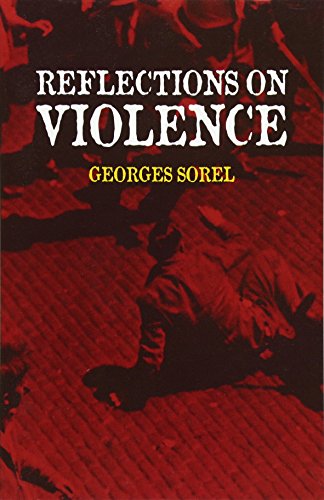Background
Sorel was born on November 2, 1847 in Cherbourg-Octeville, France, the son of a bankrupted wine merchant.



( Radicalism and the Revolt Against Reason is a work that...)
Radicalism and the Revolt Against Reason is a work that continues to have a steady and large scale impact on political and social theory fifty years since its first appearance. A study of how radical thought modifies its actions and ideologies in a time of unrealized and frustrated expectations, the focus is on Georges Sorel and the Europe of the fin de siècle, a time when socialist revolution was forcefully set aside by liberal reform. In a technique that presaged contemporary period, radical demands did not simply dissolve or disappear, they profoundly changed emphasis from the impersonal forces of history to highly personal forces of individual will. This edition includes a substantial brand new introduction by the author.
http://www.amazon.com/gp/product/0415557798/?tag=2022091-20

( Sorel developed an original and provocative theory on t...)
Sorel developed an original and provocative theory on the positive, even creative, role of myth and violence in the historical process. Sorel was a civil servant who fervently believed that only the clearest and most brutal expression of class war could effect lasting social change. This, his most important work, is a passionate outcry for the socialist overthrow of society. Reflections on Violence first appeared as a series of articles in Le Mouvement Socialiste in 1906; it appeared in book form two years later, and translations extended its influence around the world. Sorel addresses the factors underlying revolutionary movements and examines the roles of violence (the revolutionary denial of the existing social order) and force (the state's power of coercion). He further explores sources of political power, the weapons of revolutions the insurrection and the general strike and the significant role of "myths" in recruiting and motivating potential revolutionaries.
http://www.amazon.com/gp/product/0486437078/?tag=2022091-20

( The prophet of social decadence, the theorist of violen...)
The prophet of social decadence, the theorist of violence and advocate of the general strike, the critic who stood Marx on his head, Georges Sorel was one of the foremost writers of this century to write extensively on the great importance of the moral aspects of social movements. His reconstruction of socialist ethics established him as one of the most remarkable critics of Marxist thought, and his writings in many aspects anticipated contemporary interpretations. From Georges Sorel, the first of two volumes of Sorel's work, presents his major contributions to social thought?articles on Marxism, religion, syndicalism, social myths, the philosophy of history and science, as well as a large and newly translated segment of "Reflections on Violence." In his introduction, John Stanley disputes the frequently encountered view of Sorel as a reactionary or extreme rightist, and emphasizes Sorel's attempt to provide Western society with a morality based on labor, struggle, and family life.
http://www.amazon.com/gp/product/0887386547/?tag=2022091-20

(BRAND NEW FIRST EDITION First Printing hardcover, clean t...)
BRAND NEW FIRST EDITION First Printing hardcover, clean text, solid binding, NO remainders NOT ex-library slight shelfwear / storage-wear; jacket lacking WE SHIP FAST. Carefully packed and quickly sent. 201512395 Written in 1980, this is an excellent, detailed book (359 pages with index) on the philosophies of Georges Sorel. It is perhaps misleadingly titled since the advocacy of violence is only the most striking component of Sorel's writing and only one of several key recurrent themes. The book is organized thematically but also in a roughly chronological manner. This is possible because certain political/ideological movements and concepts predominated different stages of Sorel's life: Revolutionary Syndicalism, Integral Nationalism, Bolshevism, and Fascism. Each of these sections is further divided into 3 parts: The Man, The Idea, and The Impact. The last section of the book, Sorelians after Sorel, is divided chronologically into the 1920's (Sorel died in 1922) the 1930's, and The War Years and Conclusion. Why study Sorel when he seems not only wrongheaded, indeed even perverse, but also irrelevant? His erudition and profound sense of inspiration are worth witnessing. Above all, it is fascinating to see how this strange thinker inspired others and, as we say today, was always thinking outside the box. In fact, he worked as an architect of ideas, combining seemingly incompatible boxes to create new structures of thought and hence new perspectives. To study Sorel is to never take for granted again the traditional alignment or clustering of ideas. Roth pulls these disparate ideas together in a coherent way and shows how they changed, how Sorel was moved by historic events and their underlying emotional and "spiritual" significance. We recommend selecting Priority Mail wherever available. (No shipping to Mexico, Brazil or Italy.)
http://www.amazon.com/gp/product/0520037723/?tag=2022091-20

(Ainsi ont disparu tous les messies sociaux du XIXe siècl...)
Ainsi ont disparu tous les messies sociaux du XIXe siècle, sans avoir laissé aucune trace dans le mouvement économique quils avaient prétendu diriger de très haut ; leur activité sest dépensée en bavardages qui ont été rapidement oubliés ; ils nont été que des vagabonds aussi fantastiques que celui de ce conte (Georges Sorel). Les Matériaux dune théorie du prolétariat comptent, avec les Réflexions sur la violence et Les Illusions du progrès, parmi les plus grands textes de Georges Sorel.
http://www.amazon.com/gp/product/1511781076/?tag=2022091-20
philosopher theorist Revolutionary
Sorel was born on November 2, 1847 in Cherbourg-Octeville, France, the son of a bankrupted wine merchant.
Sorel moved to Paris in 1864 to attend the Collège Rollin, before entering the École Polytechnique a year later.
Not until he reached age 40 did Sorel become interested in social and economic questions. In 1892 he retired from his civil-service engineering post and devoted himself to a life of meditation and study. In 1893 he discovered Marxism and began writing the analytical critiques that constitute his most original and valuable achievement.
In 1897 Sorel was a passionate defender of Alfred Dreyfus, the Jewish army officer who was wrongly convicted of treason, but he became disgusted with the way the parties of the left exploited “the Affair” for their own political advancement. By 1902 he was denouncing the Socialist and Radical parties for advocating democracy and constitutionalism as a road to Socialism. Instead, he enthusiastically supported revolutionary syndicalism, a movement with anarchistic leanings that stressed the spontaneity of the class struggle. His best known work, Réflexions sur la violence (1908; Reflections on Violence), first appeared as a series of articles in Le Mouvement Socialiste early in 1906 and has been widely translated. Here Sorel developed his notions of myth (modeled on the syndicalist vision of the general strike) and of violence. Violence for Sorel was the revolutionary denial of the existing social order, and force was the state’s power of coercion. (His theory was later perverted and utilized by the Italian Fascist dictator Benito Mussolini. )
Throughout Sorel’s thought there runs a moralistic hatred of social decadence and resignation. He attacked the idea of inevitable progress, as developed by 18th-century philosophers, in his work Les Illusions du progrès (1908; “Illusions of Progress”) and believed that the future was what men chose to make it. Departing from the intellectual tradition of European Socialism, Sorel held that human nature was not innately good; he therefore concluded that a satisfactory social order was not likely to evolve but would have to be brought about by revolutionary action. After 1909 Sorel became disenchanted with the syndicalist movement, and, with some hesitation, he adhered, not without embarrassment and hesitation, to the monarchist movement - Action Française -
which sought to reestablish a homogeneous and traditional moral order. With the outbreak of the Russian Revolution in 1917, Sorel declared himself for the Bolsheviks, who he thought might be capable of precipitating the moral regeneration of mankind.
Sorel wrote on an extraordinarily broad range of topics, including the Bible, Aristotle, and the decline of Rome, in addition to his writings on Socialism. Among his chief works are L’Avenir socialiste des syndicats (1898; “The Socialist Future of the Syndicalists”), Les Illusions du progrès (1908; “Illusions of Progress”), and La Révolution dreyfusienne (1909; “The Dreyfusard Revolution”).
(Ainsi ont disparu tous les messies sociaux du XIXe siècl...)
( The prophet of social decadence, the theorist of violen...)
( Radicalism and the Revolt Against Reason is a work that...)
(BRAND NEW FIRST EDITION First Printing hardcover, clean t...)
( Sorel developed an original and provocative theory on t...)
Sorel became an enthusiast of revolutionary syndicalism, a movement with a strong tinge of anarchism, committed to the spontaneity of the struggle of the working class and to its independence from any party leadership. For all Sorel‘s shifts and uncertainties, he was always a passionate defender of liberty and an enemy of arbitrary government.
In an age when democracy, liberalism, and humanitarianism embodied the hopes and ideals of most European intellectuals, Sorel evolved a point of view that was not only antidemocratic and antiliberal, but denied their almost universally accepted belief in the inevitability of progress toward a better and more humane society.
